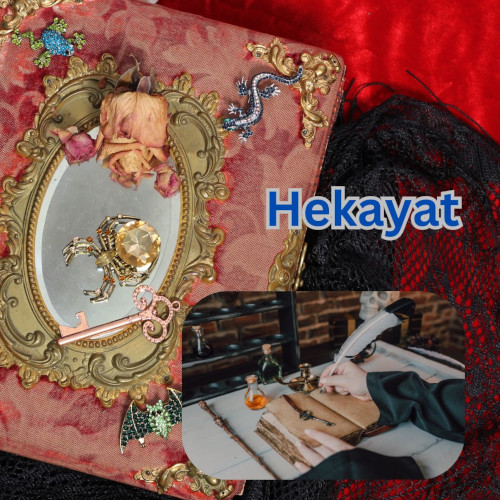Hekayat 12 from Chapter 4 of Golestan of Saadi Shirazi

English Translation for Hekayat
A preacher with an unpleasant voice thought of himself as having a melodious one and would shout uselessly. He would say that the cawing of the crow of separation was hidden in the beauty of his melodies, or that the verse "Indeed, the most hateful of voices" referred to him.
When the preacher, the 'Father of Knights,' brayed,
His clamor would shake the foundations of the city of Istakhr.
The people of the village, due to the authority he held, tolerated his nuisance and did not see it as wise to confront him. Until one day, one of the preachers of the region, who secretly harbored animosity toward him, came to visit him and said, “I’ve had a dream about you—may it be a good omen.”
The preacher asked, “What did you see?”
The visitor said, “I saw that you had a beautiful voice and the people found peace from your breath.”
The preacher pondered for a moment and said, “This is indeed a blessed dream, for you have made me aware of my flaw. It’s clear now that I have an unpleasant voice, and the people are distressed by my loud recitations. I repent and from now on, I will deliver my sermons softly.”
I am weary of the companionship of a friend,
Who finds my bad traits to be admirable.
He sees my faults as virtues,
And considers my thorns as roses and jasmine.
Where is the bold, impudent enemy?
Who will reveal my flaws to me.
متن حکایت
خطیبی کریهالصوت خود را خوشآواز پنداشتی، و فریادِ بیهده برداشتی. گفتی نعیب غُرابَ البَین در پرده الحان اوست، یا آیت اِنَّ انکَرَ الاصوات در شأن او.
اذا نَهَقَ الخَطیبُ اَبوالفَوارِس
لَهُ شَغَبٌ یَهُدُّ اصطَخرَ فارِس
مردم قریه به علت جاهی که داشت بَلیتش میکشیدند و اذیتش را مصلحت نمیدیدند. تا یکی از خُطبای آن اقلیم که با او عِداوتی نهانی داشت، باری به پرسش آمده بودش. گفت: تو را خوابی دیدهام، خیر باد. گفتا: چه دیدی؟ گفت: چنان دیدمی که تو را آواز خوش بود و مردمان از انفاس تو در راحت.
خطیب اندر این لختی بیندیشید و گفت: این مبارک خواب است که دیدی که مرا بر عیب خود واقف گردانیدی. معلوم شد که آواز ناخوش دارم و خلق از بلند خواندن من در رنج. توبه کردم کز این پس خطبه نگویم مگر به آهستگی.
از صحبت دوستی به رنجم
کاخلاق بَدَم حَسَن نماید
عیبم هنر و کمال بیند
خارم گل و یاسمن نماید
کو دشمنِ شوخچشم ِ ناپاک ؟
تا عیبِ مرا به من نماید


